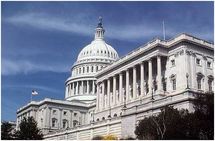
The legislation would affect the way the US government can search Americans' personal records, conduct wiretapping, and otherwise collect and use information on US citizens.
Among the provisions sure to grab attention, it revisits a secret program launched by former president George W. Bush after the September 11, 2001 attacks that collected sensitive information for years without a court order.
Lawmakers, including then-senator Barack Obama, voted last year to grant telecommunications firms that took part in the program immunity from lawsuits by Americans alleging illegal breaches of privacy rights.
Democratic Senator Russell Feingold, long a critic of government spy powers on Americans, was a chief author of the legislation presented Thursday.
The others included the number two Senate Democrat, Dick Durbin, as wells as Democratic Senators Jon Tester, Tom Udall, Jeff Bingaman, Daniel Akaka, Ron Wyden, and Robert Menendez, as well as Independent Senator Bernie Sanders.
While the legislation is a stand-alone bill, supporters of key provisions could also strive to include them when the Congress reauthorizes key sections of a sweeping intelligence bill called the PATRIOT Act later this year.
US Senate Judiciary Committee Chairman Patrick Leahy, a Democrat, said earlier this week that the panel would hold a hearing on the PATRIOT Act on September 23.
Key provisions due to expire December 31 include one that allows the government to wiretap a suspect who changes telephones, another that affects the collection of a suspect's personal records.
Another measure governs the monitoring of a "lone wolf" with no known link to foreign governments or terrorist groups.
------------------------------------------------------------------------------------------------------------------------------
Among the provisions sure to grab attention, it revisits a secret program launched by former president George W. Bush after the September 11, 2001 attacks that collected sensitive information for years without a court order.
Lawmakers, including then-senator Barack Obama, voted last year to grant telecommunications firms that took part in the program immunity from lawsuits by Americans alleging illegal breaches of privacy rights.
Democratic Senator Russell Feingold, long a critic of government spy powers on Americans, was a chief author of the legislation presented Thursday.
The others included the number two Senate Democrat, Dick Durbin, as wells as Democratic Senators Jon Tester, Tom Udall, Jeff Bingaman, Daniel Akaka, Ron Wyden, and Robert Menendez, as well as Independent Senator Bernie Sanders.
While the legislation is a stand-alone bill, supporters of key provisions could also strive to include them when the Congress reauthorizes key sections of a sweeping intelligence bill called the PATRIOT Act later this year.
US Senate Judiciary Committee Chairman Patrick Leahy, a Democrat, said earlier this week that the panel would hold a hearing on the PATRIOT Act on September 23.
Key provisions due to expire December 31 include one that allows the government to wiretap a suspect who changes telephones, another that affects the collection of a suspect's personal records.
Another measure governs the monitoring of a "lone wolf" with no known link to foreign governments or terrorist groups.
------------------------------------------------------------------------------------------------------------------------------









 Home
Home Politics
Politics









